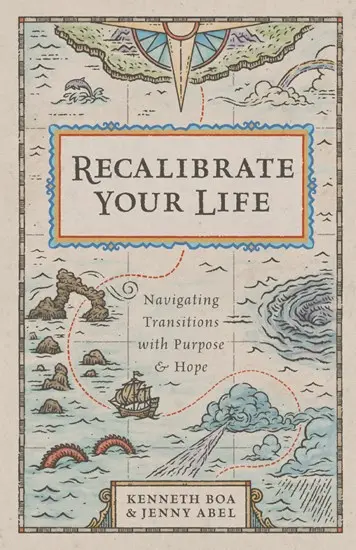The following article is based on a video transcript. Watch the full, three-part teaching series here. [vector_icon icon=”arrow-circle-o-right”]
God’s Will as a Way of Life
“How can I discover God’s will for my life?”
“How can I be sure of God’s guidance in my decisions?”
“God, what do you want me to do?”
Practically all followers of Jesus have asked questions like these. Most of us ask these types of questions not so much on a daily basis, but at an important crossroads in our lives, when we’re trying to sort out the best path forward.
But is that really the best view of discerning God’s will: something we do at the “crisis” points in life?
I think there’s a better way, a way that’s upheld throughout the Scriptures. With this view, we see discerning the will of God more as a process than as something we do only at crisis points. We also will heed Jesus’ parable of the unjust steward, realizing that if we’re faithful in little, we’ll be faithful with much. In reality, we shape and order our existence more by the hundreds of decisions we make each day. Though most of these decisions may seem trivial, and we often make them automatically without even thinking, they shape a pattern that ultimately affect the larger decisions that we make as well. Thus, when it comes to seeking God’s will for your life, the small decisions, not just the large ones, are important.
Certain choices do, of course, affect the rest of our lives. But agonizing over God’s will only in these unusual moments of heightened stress can be disastrous. A better approach is to see God’s will as a way of life rather than as an emergency support system.
A better approach is to see God’s will as a way of life rather than as an emergency support system.
In this series, we’ll examine this approach to God’s will, seeing it as a process rather than a program, and we’ll look at some of the prerequisites and principles of making decisions in a way that is both pleasing to God and fulfilling for us.
First, however, we’ll discuss why God’s will should even be a priority to us.
The Priority of God’s Will
Imagine waking up at the end of a self-centered and meaningless life. On the brink of death, you reflect on years of wasted time. You wonder:
How did I allow myself to minimize the things that I knew were important?
How did I become a slave of routine?
No matter how young or old we are, it’s wise to ponder this question. Our time on this planet is brief—list a mist that vanishes, the Scriptures tell us—and none of us can guarantee another day. None of us wants to truly waste our lives! But unless we regularly acknowledge God and his desires, we can waste our lives, coming to the end of our years without fruit and without real meaning. We postpone spiritual pursuits at our own peril—and that of others.
Let’s look at three reasons we should make God’s will a priority—seeking to be more alert and alive to the opportunities he’s providing for us right now.
Reason #1: We Owe It to God
God created us and redeemed us. He’s given us both biological life (bios) and spiritual life (zoe), so he doubly owns us. His Word says we therefore have an obligation to fulfill his will, because we’re his workmanship, created for a distinct purpose:
For we are His workmanship, created in Christ Jesus for good works, which God prepared beforehand so that we would walk in them. (Ephesians 2:10)
In other words, we’re made to be sub-creators—the One who created us and the entire world has made us so we can create good works as well. When we do this, we reflect his image. As was true of Jesus, our spiritual food is to do the will of him who has called us out of darkness into his marvelous light (1 Peter 2:9).
Reason #2: We Owe It to Ourselves
The second reason for making God’s will a priority is because it’s the only way we will enjoy the satisfaction of a truly meaningful existence on this earth. Positively speaking, God made us for a purpose, and he wants all of us is to have something worthwhile to accomplish in this world. In negative terms, making God’s will a priority is the only way we will avoid the undesirable and sometimes devastating consequences of pursuing our own will while rejecting God’s. The initial pleasures of sin never outlast the guilt, double-binds, and disillusionment of its final product.
Although at first blush God’s will may not appear best to us, Romans 12:2 tells us God’s will is good, acceptable, and perfect. It’s always wisest to pursue his desires over our own because:
- He loves us unconditionally (so he wants what’s best for us)
- He is all-knowing (so he knows what’s best for us, and has the long-term vision that we don’t); and
- He is all-powerful (so nothing can stop him from carrying out his will for us).
Making God’s will a priority is the only way we will avoid the undesirable and sometimes devastating consequences of pursuing our own will while rejecting God’s. The initial pleasures of sin never outlast the guilt, double-binds, and disillusionment of its final product.
Reason #3: We Owe It to Others
A third reason for making God’s will a priority is because we have a God-given obligation in this world to serve other people. When we make a decision, we never choose in a vacuum. Eventually, our choices have a ripple effect on other people, directly and indirectly.
Small acts of good can multiply in ways we don’t expect. Likewise, small acts of compromise and evil can multiply. As C.S. Lewis put it, “Good and evil both increase at compound interest.” Small things matter and affect those around us.
Two Analogies
Two analogies are apt for explaining why God’s will should be a priority for us.
First, we’re stewards, and ultimately, we own nothing. Jesus told a parable emphasizing that little things, not only big things, matter when it comes to stewardship. The lesson of the unjust or unrighteous steward parable was this:
He who is faithful in a very little thing is faithful also in much; and he who is unrighteous in a very little thing is unrighteous also in much. (Luke 16:10)
All of our smaller decisions create a matrix or tapestry—a pattern that has a big effect on our lives. God has entrusted each one of us with a sphere of influence. We have a responsibility of stewardship in this arena, both to the believers we encounter as well as to the unbelievers we touch. Ultimately, he owns everything, and we’re simply managing what he gives us out of his grace. Our faithfulness in this sphere, and the opportunities he gives us, will ultimately be rewarded at the judgement seat, or bema, of Christ.
While stewards manage the possessions of another, ambassadors represent the affairs of another—the interests of their king/ruler or nation. As ambassadors of Christ, we are not on earth on our own business; we, too, represent the affairs of Another. We are on the King’s business.
Both analogies emerge in Paul’s words in 2 Corinthians 5:9–20. The passage begins:
Therefore we also have as our ambition, whether at home or absent, to be pleasing to Him. For we must all appear before the judgment seat of Christ, so that each one may be recompensed for his deeds in the body, according to what he has done, whether good or bad. . . . Now all these things are from God, who reconciled us to Himself through Christ and gave us the ministry of reconciliation . . . (verses 9–10, 18)
He goes on from the stewardship analogy to the ambassador analogy:
Therefore, we are ambassadors for Christ, as though God were making an appeal through us; we beg you on behalf of Christ, be reconciled to God. (verse 20)
The Practice of God’s Will
All too often, God’s will is seen as a program laid out before us. When we view it this way, the emphasis falls on developing some technique(s) that will help you discover the details of that program as you move from one important decision to another. I think we need to go beyond this idea when asking questions like these:
- How do I know whether I ought to marry this person?
- Should I accept this job offer?
- Should I move to this city or that one?
We would do best to see the discernment of God’s will on these types of matters as a process rather than a program. People like a five-step formula or a three-step method; it’s clear, easy to follow. We like it when things are black and white. But I don’t think that seeking God’s will works that way. And that’s because his goal is a lot bigger than ours often is. His will is not so much an end as a means of knowing him better and then becoming more like him.
Who vs. How
The Bible isn’t so much a how-to-do-it manual as it is a guidebook on Who to know. As we come to know God better, we’ll begin to discern his nudgings and promptings in our lives. . . . Our paths will be illuminated when we have a growing and trusting relationship with him.
I believe Scripture is clear that, in God’s eyes, who we are takes priority over what we do. Who we are should be expressed in what we do, but what we do doesn’t define who we are. Being should animate doing.
Maybe you’ve noticed this too: The Bible concentrates on our need to cultivate intimacy with God, but it doesn’t say much about methods of determining God’s will. This is because the Bible isn’t so much a how-to-do-it manual as it is a guidebook on Who to know. As we come to know God better, we’ll begin to discern his nudgings and promptings in our lives. God is not going to be manipulated by impatient demands and magical formulas. Instead, our paths will be illuminated when we have a growing and trusting relationship with him.
David’s words in Psalm 37 reveal the nature of this relationship:
The steps of a man are established by the Lord,
And He delights in his way.
When he falls, he will not be hurled headlong,
Because the Lord is the One who holds his hand. (Psalm 37:23–24)
We’re like a toddler holding his father’s hand; when we start to fall, instinctually, Dad tightens his grip—almost before either is even conscious of what’s happening. God won’t allow us to be “hurled headlong.” This doesn’t mean we won’t ever run into difficulties. God will sometimes deliver us from struggles and trials, but sometimes he delivers us through them—even bringing us directly to himself in some cases. But in the long run, we are in his grip, he has a purpose for us, and he will accomplish it (Psalm 138:8).
Psalm 73 reinforces this emphasis on relationship over method when it comes to knowing God’s will for our lives:
Nevertheless I am continually with You;
You have taken hold of my right hand.
With Your counsel You will guide me,
And afterward receive me to glory. (Psalm 73:23–24)
A Human/Divine Synergy
In some relationships, we simply want to be told what to do, or we want to tell others what to do. We may come to another person not so much to seek true counsel but to gain approval for our predetermined plans.
A better analogy for how we seek God’s will through our relationship with him is in the joint decisions made by a married couple who enjoy an intimate relationship of mutual concern. They have respect and trust for one another. Both spouses are involved in the decisions reached, and it’s often almost impossible to distinguish the part each played in the process.
Another analogy is two people dancing. One must lead while the other follows, but the movement is not against the will of the follower. The two become greater than the sum of the parts as each moves in sync with the other.
Similarly, seeking and doing the will of God is a synergistic, divine/human process. It’s not merely divine, whereby we resign ourselves to the fact that “this is the way it will be.” At the same time, it’s not solely human, where we say to God, “This is what I’m going to do; hope you like it.”
When discerning God’s will, we should acknowledge his presence, seeking to live in dependence on him, while seeing the choices in our lives as both ours and his. There is mutuality because he loves us (and we love him), and there’s always freedom in love. Thus, we can voluntarily follow him or resist him. He will honor our choices rather than forcing his love on us or overpowering our will.
As James Jauncey put it:
God never burglarizes the human will. He may long to come in and help, but he will never cross the picket line of our unwillingness.
Looking Ahead
In summary, [ictt-tweet-inline]discerning God’s will is a process, not a program; it’s a way of life[/ictt-tweet-inline]. And his primary will is to form and forge a Christlike character in us. In turn, who we are (and are becoming) will shape how we behave and what we do.
Next, we’ll examine certain prerequisites, principles, and precepts for seeking God’s guidance. We’ll also look at what the Scriptures say about getting more sensitized, or attuned, to God, so that we will live in a way that is honoring to God, is fulfilling for us, and has a positive influence on others to become more like Christ.
Father, thank you for this time to reflect on you and on our lives. May we commit our ways to you unreservedly. Thank you that you have called us to a purposeful life, and we ask for the grace and understanding to live in that purpose. In Jesus’ name. Amen.
Watch Ken Boa’s three-part teaching series on discerning God’s will.
Button Text


